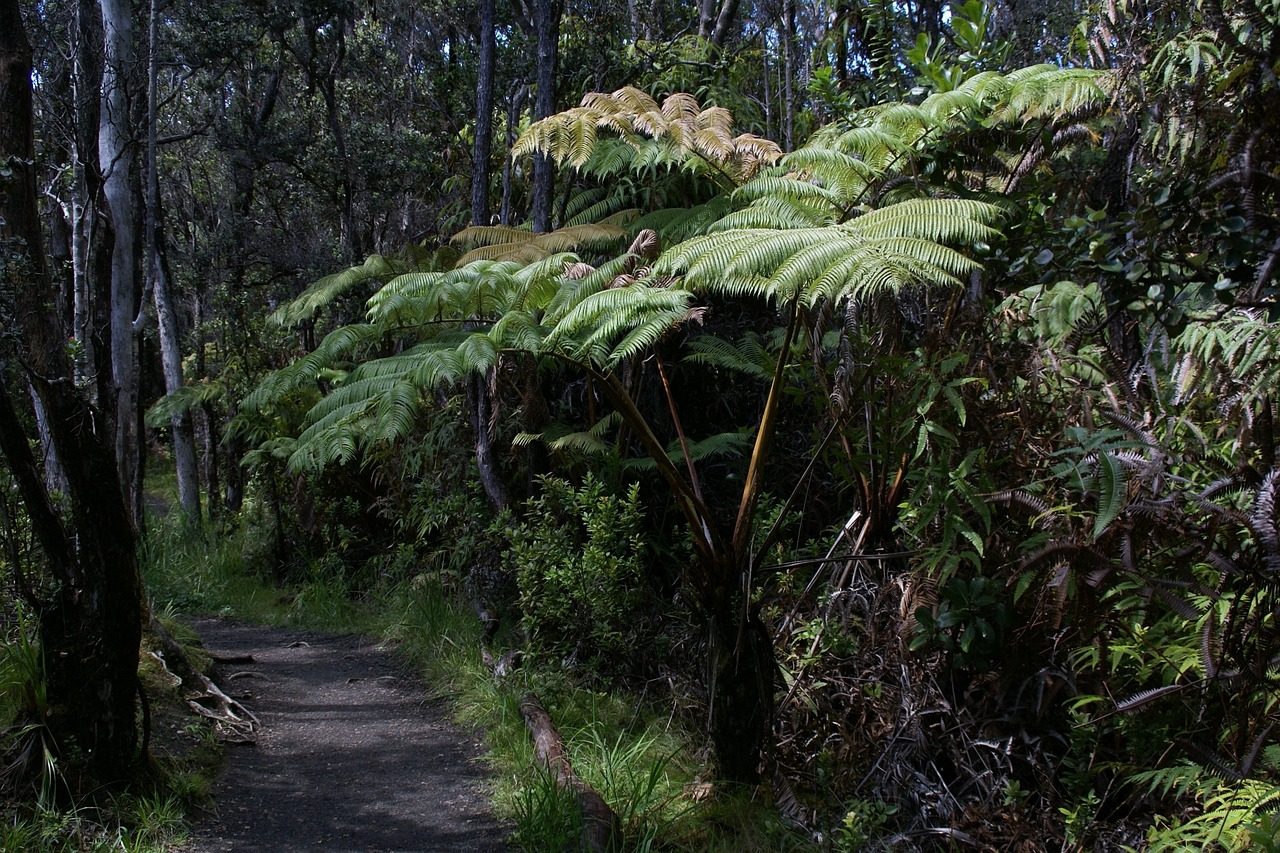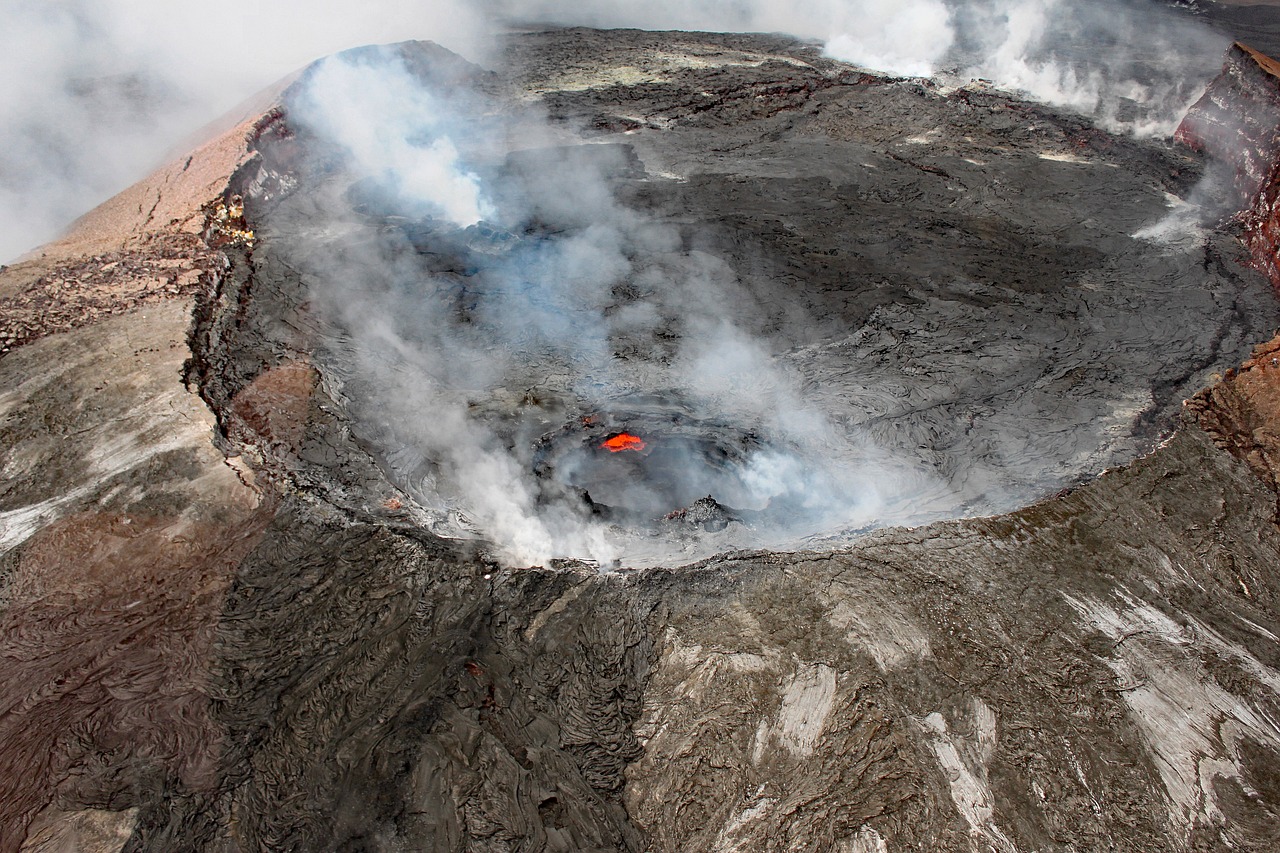Hawai'i Volcanoes National Park, located on the Big Island of Hawai'i, offers a rare and dynamic landscape that is both sacred and continuously shaped by powerful natural forces. Encompassing over 333,000 acres, the park is home to two of the world's most active volcanoes: Kīlauea and Mauna Loa. These natural wonders provide visitors with a unique opportunity to witness firsthand the creation and destruction inherent in the earth's geological processes.
The park's diverse ecosystems range from lush tropical rainforests to barren lava fields, creating habitats for a wide array of flora and fauna, including many endemic and endangered species. The nēnē, or Hawaiian goose, and the Hawaiian hawk, or ʻio, are among the native species that call the park home. The park's elevation gradient supports a variety of plant communities, including fern forests and the specialized flora of the volcanic landscapes.
Hawai'i Volcanoes National Park is not only a place of natural wonder but also of deep cultural significance. The park encompasses many sites sacred to Native Hawaiians and offers insights into the rich cultural traditions and the living relationship between the people and the volcanic landscape. The park's cultural sites, including ancient petroglyphs carved into the lava rock, are tangible connections to the past and present of Hawaiian culture.
Visitors to the park can explore its beauty and power through a network of trails that traverse both dramatic volcanic landscapes and lush rainforests. The Crater Rim Drive and Chain of Craters Road provide access to key features of the park, including steam vents, the Jaggar Museum overlook with views of Kīlauea's caldera, and the mesmerizing lava flows that reshape the land and create new earth.
The park also offers a range of educational programs and exhibits that delve into the geological activity, ecological diversity, and cultural history of the area. The Kīlauea Visitor Center is a starting point for understanding the park's significance and planning explorations of its vast and varied terrain.
Hawai'i Volcanoes National Park stands as a testament to the beauty and power of the natural world, offering visitors a profound experience of awe and respect for the forces that shape our planet. It serves as a reminder of the importance of preserving these unique landscapes and the cultural stories they hold for future generations.
Biome at Hawaii Volcanoes National Park
Hawaii Volcanoes National Park, located on the Big Island of Hawaii, offers a window into a unique and dynamic volcanic landscape. The park's diverse range of environments is influenced by its varied elevations and volcanic activity, resulting in multiple biomes. Keep on reading to learn more about the biomes at Hawaii Volcanoes National Park
Airports Near Hawaii Volcanoes National Park
This is a list of the closest airports to the park, if you plan on flying into Hawaii Volcanoes click here to read our recommendations.
| Distance to Park | Drive Time | ||
| Hilo International Airport | 46.9 miles | 41 mins | Get Directions |
| Bradshaw Army Airfield | 101.5 miles | 1 hour 16 mins | Get Directions |
| Waimea-Kohala Airport | 135.8 miles | 1 hour 43 mins | Get Directions |
| Ellison Onizuka Kona International At Keahole Airport | 145.2 miles | 2 hours 4 mins | Get Directions |
| Upolu Airport | 177.6 miles | 2 hours 26 mins | Get Directions |
| Hana Airport | 178.9 miles |
Cities Near Hawaii Volcanoes National Park
Here are some of the closest cities and towns near the park, take a look at our recommendations for where to stay when visiting Hawaii Volcanoes.

| Distance to Park | ||
| Volcano | 6.6 miles | Get Directions |
| Nanawale Estates | 33.4 miles | Get Directions |
| Hilo | 38.5 miles | Get Directions |
| Kailua-Kona | 88.5 miles | Get Directions |
| Hana | 173.9 miles | |
| Wailea | 194.6 miles | |
| Kihei | 200.8 miles | |
| Lahaina | 226.7 miles |
Hawaii Volcanoes National Park TimeZone
The timezone at Hawaii Volcanoes is Pacific/Honolulu, the current time here is:
Sunrise and Sunset Times at Hawaii Volcanoes National Park
This table shows the sunrise and sunset times at Hawaii Volcanoes for the next 10 days, use it to plan your day around Hawaii Volcanoes stunning displays.
|
Date |
Sunrise |
Sunset |
| January 30, 2026 | 06:54 | 18:13 |
| January 31, 2026 | 06:54 | 18:14 |
| February 01, 2026 | 06:54 | 18:14 |
| February 02, 2026 | 06:53 | 18:15 |
| February 03, 2026 | 06:53 | 18:15 |
| February 04, 2026 | 06:52 | 18:16 |
| February 05, 2026 | 06:52 | 18:16 |
| February 06, 2026 | 06:52 | 18:17 |
| February 07, 2026 | 06:51 | 18:18 |
| February 08, 2026 | 06:51 | 18:18 |
Weather at Hawaii Volcanoes National Park
This table shows weather averages around the year at Hawaii Volcanoes National Park, it provides information on average rainfall, as well as maximum and minimum temperatures. Be sure to consult it when planning your trip.
|
Month |
Temperatures |
Precipitation |
Our Opinion |
|---|---|---|---|
|
Month |
Temperatures |
Precipitation |
Our Opinion |
|
Month |
Temperatures |
Precipitation |
Our Opinion |
|
Month |
Temperatures |
Precipitation |
Our Opinion |
|
Month |
Temperatures |
Precipitation |
Our Opinion |
|
Month |
Temperatures |
Precipitation |
Our Opinion |
|
Month |
Temperatures |
Precipitation |
Our Opinion |
|
Month |
Temperatures |
Precipitation |
Our Opinion |
|
Month |
Temperatures |
Precipitation |
Our Opinion |
|
Month |
Temperatures |
Precipitation |
Our Opinion |
|
Month |
Temperatures |
Precipitation |
Our Opinion |
|
Month |
Temperatures |
Precipitation |
Our Opinion |
| January | 17.8 °C / 26.6 °C | 192.8mm | Good Weather |
| February | 17.8 °C / 26.4 °C | 255.6mm | Good Weather |
| March | 18.4 °C / 26.4 °C | 310.7mm | Good Weather |
| April | 18.9 °C / 26.7 °C | 236.4mm | Good Weather |
| May | 19.6 °C / 27.7 °C | 168.6mm | Good Weather |
| June | 20.2 °C / 28.2 °C | 179.5mm | Good Weather |
| July | 20.9 °C / 28.8 °C | 230.2mm | Good Weather |
| August | 21.2 °C / 28.9 °C | 283.8mm | Good Weather |
| September | 20.9 °C / 29.2 °C | 220.2mm | Good Weather |
| October | 20.5 °C / 28.7 °C | 259.4mm | Good Weather |
| November | 19.8 °C / 27.5 °C | 347.1mm | Good Weather |
| December | 18.7 °C / 26.6 °C | 309.6mm | Good Weather |
